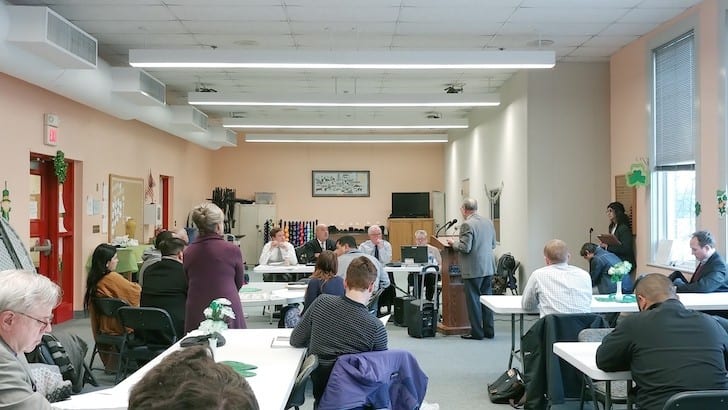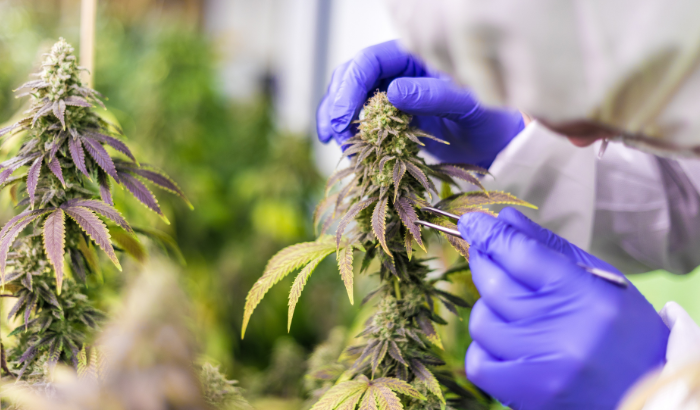
The recreational cannabis licensing process is a lot like the products that stores will soon offer in Mass when they finally open. There are similarities from town to town and shop to shop, especially when viewed from afar, but look closely and you’ll find multiple different shades of a colorful and complex system.
In the years since voters came out in support of recreational weed, several city councils and boards of selectmen have been criticized by everyone from business interests to activists for their greed and opacity. Not to mention the confusing labyrinths that certain municipalities have made applicants navigate. But as the licensing approval process in some towns and cities has been compared to both ransom and extortion, this week the Somerville Licensing Commission, in what appears to be a statewide first, passed a measure to sidestep at least some of the insanity that hopeful legal weed growers and sellers face in Mass. At a meeting Monday evening, the body voted unanimously to waive its $900 application fee.
Fee or no fee, the process in Somerville is somewhat straightforward, at least on the surface. We’ll see how things play out over the next several months and then years, but the basic step-by-step is designed to look something like this:
- First and foremost, the business has to get its host agreement in order. This is the case no matter what city or town you are in; if you can’t secure this invitation from the municipality in which you hope to set up shop, you can’t proceed with the Cannabis Control Commission at the state level. The host agreement, which among other stipulations designates 3 percent of cannabiz revenue for Somerville, comes first, with everything else coming after.
- The operation overseeing all of this is Mayor Joe Curtatone’s Marijuana Advisory Committee. Comprised of stakeholders from the city’s health and human services, planning, economic development, and police departments, the MAC is, well, the mack.
- Applicants will have to stop by the Zoning Board of Appeals in order to make sure the building and neighborhood where they plan on setting up shop is zoned for cannabis, retail, etc.
- They’ll also have to visit the Somerville Licensing Commission, which a 2018 city ordinance gave significant discretion over the selection gauntlet.
At the meeting on Monday, commissioners noted the potential legal challenges that other municipalities might face for their outrageous demands. “We shouldn’t try to penalize [cannabis businesses] with excessive fees,” Licensing Commission Chairman Joe Lynch said. The suspension of the fee came on the recommendation of City Clerk John Long, who said the suggestion was “in the interest of making access as easy as possible for economic empowerment applicants.”
According to Long, no other licensing body in Mass has enacted such measures.
For the first two years of cannabis licensing in the city, only two groups of applicants will be considered: one that includes those who have been disproportionately impacted by the War on Drugs, along with Somerville residents and cooperatives, and another group that includes entities with existing medical marijuana licenses. Applications are due on April 5, at which point the three existing medical dispensaries—Liberty Cannabis in Union Square, Sira Naturals in Davis Square, and Revolutionary Clinics outside of Sullivan Square—are expected to throw their hats in the ring.
Despite the installation of a proper bureaucracy and some complaints from members of the public about a lack of community input—a criticism that could and should be leveled almost anywhere, including towns with bans or moratoriums—Somerville officials have apparently made efforts to streamline processes, at least compared to other cities. As the Somerville Journal reported last month:
In zoning and licensing, the City drew comparisons for the various uses to uses that already exist in the zoning. A marijuana testing laboratory, for example, falls under the same regulation as a typical laboratory.
“We wanted to keep things simple, and the theory behind that is marijuana is now legal in the state,” Mello said. “So, we are going to treat any type of laboratory, whether they are studying the scientific properties of coffee or marijuana, as the same.”
In the interest of moving things along on the recreational front, Long also recommended that the commission keep existing fees related to legal notices and abutter notifications. He also endorsed setting dispensary hours to reflect those of package stores. In the meantime, for organizational purposes, in addition to the $900 fee waiver that was approved, the clerk spurred the commission to shift the designated licensing period for dispensaries from five whole years to five years from issuance to the fifth occurring December 31.
Speaking of economic empowerment applicants in particular, Chairman Lynch told DigBoston, “They’re getting hit with fees from all over the place. We’re just doing what we can do. The intent of Commonwealth voters was to give certain people a leg up.
“This is a very expensive proposition for anyone to get into. I think sometimes we forget that to start any business requires an awful lot of capital. The marching orders from the City Council is to assist these folks.”


























